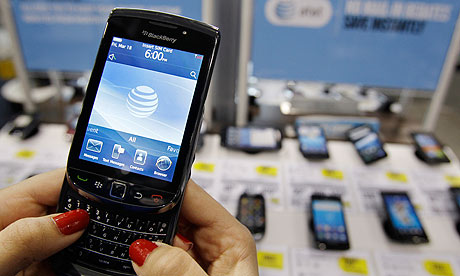Шукати в цьому блозі
середа, 6 липня 2011 р.
RIM loses 1m BlackBerry users in US while Android and Apple boom
ComScore data shows that nearly one in three US mobile users now has smartphone, with Android and Apple taking two-thirds of share – but RIM, Microsoft and Palm are losers
BlackBerry
There are now 1m less BlackBerry users in the US. Photograph: Paul Sakuma/AP
BlackBerry-maker RIM lost more than 1 million users in the US in the three months to May, as Google's Android platform cemented its lead as the most-used smartphone platform there and Apple gained more than 3 million users, according to new statistics from market research company comScore.
The figures confirm trends that are now becoming endemic in the US market for Android and RIM, which has struggled with falling profitability and handset prices as it tries to retain customers.
Smartphone ownership in the US has risen by 11% in the three months, from 69.1 million users to 76.8 million people, representing 32.8% of the 234 million Americans aged over 13 using a mobile phone, comScore says.
In the period from February to May there were nearly 6.5 million new Android users, up to 29.2 million, while iPhone users rose from 17.4 million to 20.4 million. Apple thus passed RIM, which fell from just under 20 million to 19 million.
US smartphone share and users
share (%)
share (%)
absolute numbers (million)
absolute numbers (million)
Share source: comScore. User numbers: calculated
three months ending Feb 2011 May 2011 Feb 2011 May 2011 change in users (million)
Android 33 38.1 22.8 29.26 6.46
Apple 25.2 26.6 17.41 20.43 3.02
RIM 28.9 24.7 19.97 18.97 -1
Microsoft 7.7 5.8 5.32 4.45 -0.87
Palm 2.8 2.4 1.93 1.84 -0.09
total users 69.1 76.8 67.44 74.96
The data suggest that all platforms except Android and Apple lost users as well as share in the three-month period. The comScore data are collected through a survey of more than 30,000 US mobile subscribers. It is not clear whether that includes pay-as-you-go customers, though BlackBerry users would probably only be a small proportion of PAYG users.
The data suggest that the Microsoft platform – principally the ageing Windows Mobile – lost 860,000 users. Palm, which last produced a phone nearly two years ago, dropped from 1.93 million to 1.84 million users, according to the data.
RIM now faces serious challenges both external and internal. In its last quarter, to the end of May, it reported a 9.6% fall in profits despite revenues up nearly 16% year-on-year, and a dramatic fall in the average selling price of its devices.
But worse may be ahead, according to internal memos that have leaked to the web recently. In an open letter sent to the website BGR.com last week, a RIM staffer – apparently in a senior position – criticised the company's lack of focus.
"I desperately want RIM to regain its position as a successful industry leader. Our carriers, distributors, alliance partners, enterprise customers, and our loyal end users all want the same thing … for BlackBerry to once again be leading the pack," the executive wrote. (The Guardian has not been able to verify the identity of the writer – but the content chimes with criticisms of RIM's operation made by other previous RIM staffers.)
The RIM executive suggests that:
Let's obsess about what is best for the end user. We often make product decisions based on strategic alignment, partner requests or even legal advice – the end user doesn't care. We simply have to admit that Apple is nailing this and it is one of the reasons they have people lining up overnight at stores around the world, and products sold out for months. These people aren't hypnotized zombies, they simply love beautifully designed products that are user centric and work how they are supposed to work. Android has a major weakness – it will always lack the simplicity and elegance that comes with end-to-end device software, middleware and hardware control. We really have a great opportunity to build something new and "uniquely BlackBerry" with the QNX platform.
He also suggests cutting back on projects to increase focus, and "becoming developer friendly" because there "is no polite way to say this, but it's true – BlackBerry smartphone apps suck. Even PlayBook, with all its glorious power, looks like a Fisher Price toy with its Adobe AIR/Flash apps. Developing for BlackBerry is painful, and despite what you've been told, things haven't really changed that much since Jamie Murai's letter." Murai's letter in February 2011 complained about the excessive complication of developing for the PlayBook.
He also suggests that the concentration on Flash as a differentiator from the iPad is "lazy marketing". "I've never seen someone buy product B because it has something product A doesn't have. People buy product B because they want and lust after product B."
RIM responded to the publication of the memo with a long statement saying in part that "it is fair to say that the senior management team at RIM is nonetheless fully aware of and aggressively addressing both the company's challenges and its opportunities. RIM recently confirmed that it is nearing the end of a major business and technology transition. Although this transition has taken longer than anticipated, there is much excitement and optimism within the company about the new products that are lined up for the coming months."
But that only prompted more letters from RIM staff, two more of whom wrote to BGR. The key one complained that a small core of 200-300 employees have to ensure that the core services – RIM's servers for email and messaging – work around the clock, a process "made worse by poor management decisions we deal with every day".
RIM has not responded to the second set of letters.
Read also:
http://videochatpals.com/articles/entry/When-To-Go-For-A-Macintosh-Cleaning-solution
http://www.robatubble.com/blogs.php?action=show_member_post&ownerID=1331&post_id=2371
http://www.webucket.com/sexymenhot/blogs/entry/Choosing-the-Best-Spy-ware-Elimination-Resource
Підписатися на:
Дописати коментарі (Atom)

Немає коментарів:
Дописати коментар